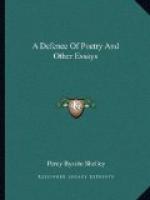The natural philosopher, in addition to the sensations common to all men inspired by the event of death, believes that he sees with more certainty that it is attended with the annihilation of sentiment and thought. He observes the mental powers increase and fade with those of the body, and even accommodate themselves to the most transitory changes of our physical nature. Sleep suspends many of the faculties of the vital and intellectual principle; drunkenness and disease will either temporarily or permanently derange them. Madness or idiotcy may utterly extinguish the most excellent and delicate of those powers. In old age the mind gradually withers; and as it grew and was strengthened with the body, so does it together with the body sink into decrepitude. Assuredly these are convincing evidences that so soon as the organs of the body are subjected to the laws of inanimate matter, sensation, and perception, and apprehension, are at an end. It is probable that what we call thought is not an actual being, but no more than the relation between certain parts of that infinitely varied mass, of which the rest of the universe is composed, and which ceases to exist so soon as those parts change their position with regard to each other. Thus colour, and sound, and taste, and odour exist only relatively. But let thought be considered as some peculiar substance, which permeates, and is the cause of, the animation of living beings. Why should that substance be assumed to be something essentially distinct from all others, and exempt from subjection to those laws from which no other substance is exempt? It differs, indeed, from all other substances, as electricity, and light, and magnetism, and the constituent parts of air and earth, severally differ from all others. Each of these is subject to change and to decay, and to conversion into other forms. Yet the difference between light and earth is scarcely greater than that which exists between life, or thought, and fire. The difference between the two former was never alleged as an argument for the eternal permanence of either, in that form under which they first might offer themselves to our notice. Why should the difference between the two latter substances be an argument for the prolongation of the existence of one and not the other, when the existence of both has arrived at their apparent termination? To say that fire exists without manifesting any of the properties of fire, such as light, heat, etc., or that the principle of life exists without consciousness, or memory, or desire, or motive, is to resign, by an awkward distortion of language, the affirmative of the dispute. To say that the principle of life may exist in distribution among various forms, is to assert what cannot be proved to be either true or false, but which, were it true, annihilates all hope of existence after death, in any sense in which that event can belong to the hopes and fears of men. Suppose, however,




